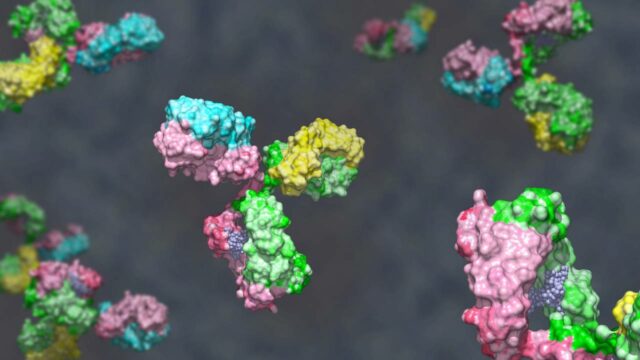
Kliniska effekter observerade med Alligators 4-1BB-agonist
Genom partnerskapet med det USA-baserade bioteknikbolaget Aptevo Therapeutics utvärderar Alligator Bioscience den bispecifika antikroppen ALG.APV-527 för behandling av solida tumörer i en fas I doseskaleringsstudie. Bolagen har meddelat positiva interimsresultat från doseskaleringsdelen av studien, och BioStock pratade med Alligators vd Søren Bregenholt för att få veta mer.
Det svenska bioteknikbolaget Alligator Bioscience utvecklar tumörriktade antikroppar. Bolaget har nyligen haft framgångar med sin ledande läkemedelskandidat, CD40-agonisten mitazalimab. Kandidaten nådde proof-of-concept i en fas II-studie i första linjens patienter med bukspottkörtelcancer i kombination med mFOLFIRINOX, som är standardbehandlingen med cellgifter för denna patientgrupp.
Den bekräftade objektiva responsfrekvensen (ORR) uppgick till 40 procent och överträffade tröskelvärdet för att uppfylla det primära effektmåttet som fastställts för studien. Andra viktiga datapunkter som sticker ut är 12,5 månaders varaktighet av respons (DoR), 7,7 månaders progressionsfri överlevnad (PFS) och 14,3 månaders total överlevnad (OS). Dessa indikerar en ytterligare tydlig klinisk fördel med mitazalimab jämfört med enbart kemoterapi.
Nu växlar bolaget upp inför fas III med mitazalimab, med planer på att inleda studien i början av 2025 med hjälp av en lämplig partner. Läs mer här.
ALG.APV-527 – en bispecifik antikropp riktad mot 4-1BB
CD40 är inte det enda molekylära målet som Alligator Bioscience undersöker. Bolaget utvecklar även två cancerimmunterapikandidater som riktar sig mot immunsystemaktivatorn 4-1BB: ATOR-1017, som har genomgått fas I, och ALG.APV-527 (527), som för närvarande genomgår fas I.
527 är en bispecifik antikropp med en tumörbindande del och en immunmodulerande del. Den tumörbindande delen av 527 riktar sig mot det tumörassocierade antigenet 5T4, som är ett protein som uttrycks i flera tumörtyper och aggressiva tumörceller. När 5T4-proteinet har upptäckts kommer den immunmodulerande delen av molekylen in i bilden, genom att känna igen och aktivera 4-1BB. Detta stimulerar sedan de immunceller som är involverade i tumörkontroll och dödar tumörcellerna som uttrycker 5T4-proteinet.
Utvecklad i samarbete med Aptevo
Den terapeutiska potentialen med samstimuleringen av 4-1BB stöds av studier utförda av den ledande 4-1BB-experten professor Ignacio Melero och hans team vid University of Navarra i Spanien. Resultaten publicerades i den vetenskapliga tidskriften Nature Communications i december 2021.
Under 2017 inledde Alligator ett samarbete med det amerikanska bioteknikbolaget Aptevo Therapeutics för att utveckla 527. I slutet av 2022 godkände FDA starten av en klinisk fas I-studie, som inleddes under Q1 2023.
Studien är en öppen multicenterstudie som inkluderar en doseskaleringsfas (den fas där Alligator/Aptevo rapporterade lovande interimsdata) som följs av en dosexpansionsfas när den ideala dosen har identifierats. Studien genomförs på upp till 10 kliniker i USA och inkluderar vuxna patienter med tidigare behandlade solida tumörtyper som sannolikt uttrycker 5T4-antigenet.
Interimsdata från fas I med positiv doseskalering med 527
I takt med att doseskaleringsdelen av studien fortskrider, med mer än hälften av patienterna inkluderade, meddelade Alligator förra veckan positiva resultat från studien. Enligt bolaget tolererades behandlingen överlag väl och den uppmätta plasmakoncentrationen på 527 hos patienter överensstämmer med den administrerade dosen. Dessutom visar biomarköranalyser uttrycket av målmolekylerna (4-1BB och 5T4) i tumörbiopsier och bekräftar den biologiska aktiviteten hos 527.
Alligator rapporterade tecken på klinisk aktivitet och gynnsam farmakodynamisk aktivitet för två kraftigt förbehandlade patienter med bröstcancer, vilket stödjer läkemedlets biologiska aktivitet. En av dessa två patienter stannade kvar i studien i sju månader och den andra har varit kvar i studien i mer än nio månader. Båda patienterna uppnådde stabil sjukdom (d.v.s. tumörstorleken förblev stabil jämfört med storleken när patienterna inkluderades) som bästa övergripande svar.
Vd kommenterar
BioStock kontaktade Alligators vd Søren Bregenholt för att få en bättre förståelse kring dessa resultat.
Søren, your lead asset, mitazalimab, targets CD40. How does having a different target, 4-1BB in this case, fit into the company’s development strategy?
– In essence, these programmes aim to solve the same fundamental challenge of ensuring a sufficiently strong and durable T-cell response in the tumour to provide cancer patients better clinical outcomes. Having molecules against two different mechanisms broadens the opportunities and minimises the risk of Alligator’s pipeline. In addition, our drug candidates build on Alligator’s strong technology foundations minimising our technology risk. Importantly, our pipeline contains molecules across all phases from discovery to phase II, allowing us to continue to generate value long term. In all those aspects ALG.APV-527 is an important part of Alligator’s strategy.

527 is a bispecific antibody, meaning it actually has two targets, 4-1BB and 5T4. Why is this important?
– 4-1BB is expressed on and activates T and NK cells – the cells responsible for eliminating cancer cells in the tumour. Therefore 4-1BB activators have great potential as cancer therapies. The biggest challenge however is to direct the immune activation to the tumour, and not cause immune-mediated side effects in other parts of the body. ALG.APV-527 has the potential to solve this problem as it is designed to only be active when it binds to both 4-1BB and 5T4 simultaneously. As 5T4, a so-called tumour-associated antigen, is only expressed in certain tumours and not in normal healthy tissue, ALG.APV-527 only stimulates the immune system inside the tumour. This should result in a good efficacy safety balance, allowing ALG.APV-527 to be used in combination with other drugs like chemotherapy and checkpoint inhibitors.
What are the potential indications that 527 could treat?
– As I just mentioned the underlying idea is to treat tumours that express 5T4. These include breast cancer, non-small cell lung cancer, colorectal cancer and renal cancer, amongst others. In the ongoing trial we are testing the molecule as single-agent therapy. The hypothesis is that ALG.APV-527 will eventually be used in combination with another anticancer treatment. The determination of indication(s) for clinical development will be based on emerging clinical and translational data from the ongoing phase I study, as well as on a comprehensive assessment of the development potential of this molecule in the evolving field of oncology R&D.
Could you elaborate on the significance of this interim data?
– The interim data is a very good first step in the clinical development of ALG.APV-527. The data demonstrate that the drug is safe at the doses tested and induces the right biological effects. And we see early signs of clinical benefit in heavily pretreated breast cancer patients that are experiencing a sustained period of tumour control with the ALG.APV-527 monotherapy. That provides us with confidence in the future development of ALG.APV-527.
Finally, what comes next for this study?
– The very first and very important priority is to complete the planned dose-escalation part of the study and obtain a clinically meaningful read-out of the data. That we expect during the second half of 2024. We believe that the data will support continuation of its clinical development with the optimal dose. The next step will be to combine ALG.APV-527 with another immunotherapy such as anti-PD1 in predefined tumour types that are relevant for continued clinical development. From there on the emerging clinical data, unmet medical need and commercial potential will guide the subsequent development of ALG.APV-527.
Innehållet i BioStocks nyheter och analyser är oberoende men BioStocks verksamhet är i viss mån finansierad av bolag i branschen. Detta inlägg avser ett bolag som BioStock erhållit finansiering från.
